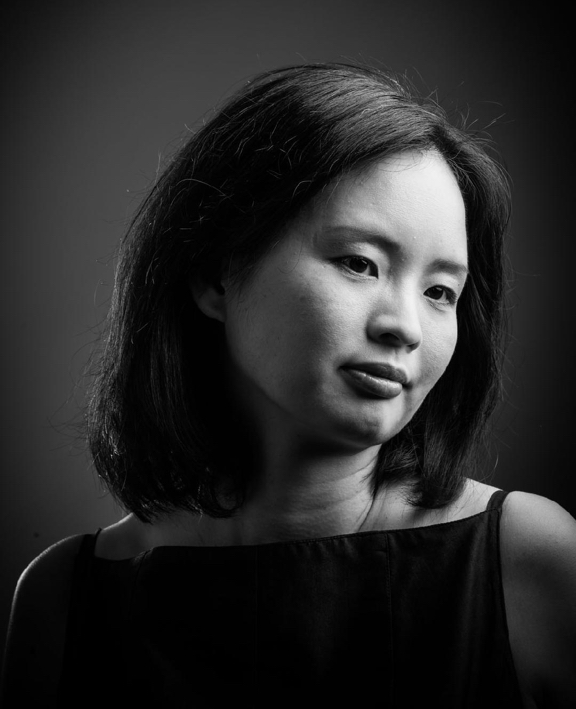
Reminiscence II (2019) – Yuan Chen Li
離歌 II (2019) – 李元貞
The Reminiscence II applies the form Theme and Variations, a common structure in genre for Guqin (古琴) that gives the dramatic rendering of any given theme. Li’s theme is an adaptation of a tune sung by her late grandmother Quan Guan Fu (況光福) about the festivity of her hometown, the separation caused by the war, and the sense of wandering and loneliness. By composing out of this tune, Li presents the complexity of the immigration in the modern time, and wishes her late grandmother a wonderful journey to heaven.
李元貞的《離歌》系列作品採用亞洲傳統的音響,揉和現代音樂技巧,處理的是慣常對立的元素。《離歌 II》環繞的是作曲者之祖母況光福在失智的歲月中嗚咽的歌聲,唱著別離、逃難、漂流、與孤單的心情,並藉由這首作品呈現出因戰亂而移民的心情。作曲者在追憶逝世的祖母同時,也希望能與世界祈福,共願太平。

 Yuan Chen Li – composer
Yuan Chen Li – composer
Yuan-Chen Li is Portland based composer, she is also an avid improvisor (piano and guqin), and educator. Li first arrived on the contemporary music scene in Taiwan with her very personal use of instrumentation and style in her chamber music piece Zang (the funeral) in 2000. In 2003, the expression and orchestration of her orchestral work Awakening won the prize at the Asian Music Festival 2003 in Tokyo from the Asian Composers’ League, and was subsequently premiered by the Tokyo Philharmonic Orchestra. In recent years, Li’s music reflects her transformation of processes and concepts in Chinese phonology, Taiwanese chamber and aboriginal music, Asian traditional arts, literature, and Buddhism into a compositional technique for solo, chamber, and orchestra of both Western and Chinese instruments, offering new experience to her audience and collaborators with the cross-cultural and cross-disciplined approach to musical time, space, and drama. With her virtuosity in instrumentation and fluency in converging and synthesizing contrastingly cultural, musical and conceptual ideas, her treatment of the space of the sonority, temporality, texture, and syntax have engaged musicians of different practices, critics, researchers, and worldwide listeners.Her Taiwanese upbringing, a Buddhist spirit, Western musical knowledge, and the symbolic aspects of nature and art, have inspired her work. The range of Li’s repertoire extends from large-scale force, such as orchestra and concerto to more sensitive chamber and solo music.
李元貞 – 作曲家
李元貞,為臺灣年輕輩作曲家。20歲時即以室內樂《葬》不尋常的配器與北管風格使她受到作曲界的關注,而在 2003年【東京2003年亞洲音樂節】(Asian Music Festival 2003 in Tokyo) 首演的大型管絃樂《春日醉起言志》顯示她卓越的管絃樂法與想像力,為“某種程度似乎總結了近半個世紀台灣追求二十世紀「音樂現代性」的成果”(連憲升, 2008)。碩士學位的代表作《間奏曲:參》納用古琴,轉化戲曲聲韻的音色現象至室內樂的樂器實踐,來闡述禪坐的心靈空間。作曲家李子聲評(2010):「少見作品編制為十件西洋樂器與罕見用於合奏的中國古琴,此異質性與個性極強的古琴並非如往常作曲家將之視為主奏者的處理手法,而是徹底融入合奏中,與其他樂器平起平坐,共同營造出樂曲迷人的氛圍。」而她在古箏獨奏《貓嬉》所運用的肢體、念唱或演奏場域等表演元素,解放古箏固有的性向,其逆向操作和趣味大受傳統音樂界的矚目。編曲風格多元,除了為國寶級客家歌手賴碧霞等改編國樂團伴奏外(2006),也在2010年的改編作品《福爾摩沙之民歌新聲集》,以台灣四大語系國、台、客暨原住民語等流行歌謠組成,打造精緻藝術化、適合古典美聲的「民歌集」。留美後的寫作重心轉為開發音樂中的意念與聲域兩者之間的迴遊與轉化,例如古箏協奏曲《飛天》,大提琴協奏曲《漂點》,利用獨奏與協奏的關係,在支聲複音 (heterophony) 與獨創的梵唄體 (free-chant) 來闡述人與自然,人與社會的衝突與包容。
